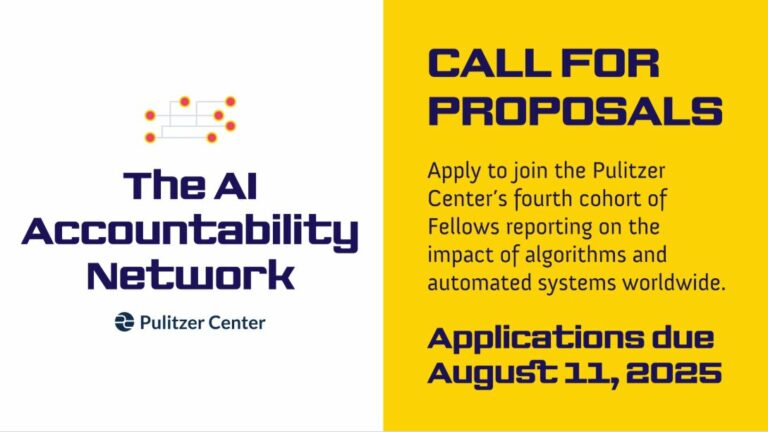Deadline: August 11, 2025
Applications are open for the Pulitzer Center’s AI Accountability Fellowships 2025-2026. AI and other predictive technologies have been used to make policy decisions, understand disease, teach our children, and monitor our work for years. The hype around generative AI is now supercharging the spread of these systems while citizens have little insight into how they work, who profits from them, and who gets hurt.
Through the AI Accountability Fellowships, the Pulitzer Center aims to support in-depth, high-impact reporting projects that document and explain the opportunities, harms, and regulatory and labor issues surrounding AI systems. The Fellowship program provides selected journalists with financial support, a community of peers, mentorship, and training to pursue in-depth reporting projects that interrogate how AI systems are funded, built, and deployed by corporations, governments, and other powerful actors.
Launched in 2022, the AI Accountability Fellowships have so far supported 27 journalists from five continents. Previous Fellows reported on a range of in-depth stories that gives a nuanced look at each stage of the AI supply chain and its real-life consequences. Their reporting has triggered policy reforms, sparked official inquiries, and inspired college journalists to start their own investigations and student poets to examine AI accountability.
Benefits
- Journalists selected as AI Accountability Fellows will be provided up to $20,000 to pursue their reporting projects. Funds can be used to pay for records requests, travel expenses, data analysis, and stipends, among other costs.
- In addition, the Fellows will have access to mentors from different fields and relevant training with a group of peers that will help strengthen their reporting projects.
- Successful applicants will be expected to join a mandatory 1.5-2-hour meeting held every month, contribute to at least one community call during the Fellowship, and engage with other Fellows in virtual meetings and on the community’s dedicated online platform. They are also encouraged to attend a monthly virtual training session. Such collaborations and participation in training sessions and meetings are requirements of the Fellowship program.
- Working and learning with a diverse group of journalists from around the world can illuminate unforeseen connections among stories and strengthen everyone’s projects with new perspectives. If you are pursuing a good story but cannot commit to the requirements of a Fellowship, you can try applying for an AI Reporting Grant.
Eligibility
- Open to journalists from anywhere in the world to report on the impacts of algorithmic and automated systems on their communities. They encourage journalists from the Global South and from communities that are underrepresented in the media to apply.
- While they welcome projects on a broad range of issues, they are seeking to support at least two projects on transparency and governance in relation to AI. This includes projects that follow the money across borders; shed light on opaque and harmful AI supply chains; or report on legislation, business practices, and organizations that exacerbate the lack of accountability and transparency of AI systems.
Application
To apply, you will be asked to provide the following:
- A short statement of purpose: how this Fellowship fits in your career path and why you are best positioned to be an Al Accountability Fellow. (500 words)
- A detailed description of the reporting project you seek to pursue during your Fellowship. Do not propose general themes but propose a concrete project that shows some pre-reporting on the subject. A compelling, well-researched project proposal with a reporting plan will help you stand out among dozens of applicants. (500 words)
- A budget that lays out anticipated costs of the project. Categories may include records requests, software, data analysis, travel and lodging, and stipends. If your budget exceeds the maximum amount provided for this fellowship ($20,000), include your other funding sources that will allow you to complete this project.
- Three examples (links) of your best stories published in the past three years (not necessarily on artificial intelligence).
- A letter of commitment or interest from a media organization(s) that would publish your story(ies). If you are a staff reporter, a signed letter from your editor or newsroom manager confirming you have their support in applying for the AI Accountability Fellowship. This letter should explicitly state that your newsroom will allocate time for you to participate in the Fellowship activities and the newsroom will support publishing the stories you produce through this Fellowship. It can also include information on why your manager thinks you would be suited for this Fellowship.
- Three professional references: These can be either contact information or letters of recommendation.
- A copy of your resume or curriculum vitae.
For more information, visit AI Accountability Fellowships.

